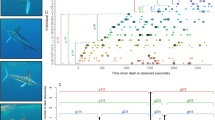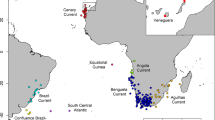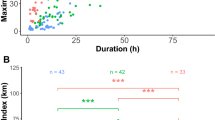Abstract
Flock-foraging and the role of white plumage in gulls and other seabirds have been the subject of much debate1–4. At first sight it seems that competition within the flock would render flock formation against the interest of the bird who finds the fish school, as the fish must then be shared with birds joining the flock. However, it is also possible that flock formation is neutral or even beneficial to the individual members5, including the bird that found the fish4,6 (the 'first finder'). Here we show that the fishing success of individual black-headed gulls, Larus ridibundus, increases with flock size up to at least eight birds. Part of the reason is that the fish school is more vulnerable when attacked by several gulls. The first gull to reach a fish school therefore benefits from being joined by others, and conspicuous white upper parts in gulls may act as a means of attracting other gulls to the flock and hence improving hunting success.
This is a preview of subscription content, access via your institution
Access options
Subscribe to this journal
Receive 51 print issues and online access
$199.00 per year
only $3.90 per issue
Buy this article
- Purchase on Springer Link
- Instant access to full article PDF
Prices may be subject to local taxes which are calculated during checkout
Similar content being viewed by others
References
Darwin, C. The Descent of Man, and Selection in Relation to Sex (Murray, London, 1871).
Craik, K. J. W. Nature 153, 288 (1944).
Tinbergen, N. The Herring Gull's World (Collins, London, 1953).
Simmons, K. E. L. Br. Birds 65, 465–479, 510–521 (1972).
Krebs, J. R., MacRoberts, M. H. & Cullen, J. M. Ibis 114; 507–530 (1972).
Alcock, J. Animal Behaviour: An Evolutionary Approach 3rd edn (Sinauer, Massachusetts 1984).
Bradley, J. V. Distribution-free Statistical Tests (Prentice-Hall, Englewood Cliffs, 1968).
Scott, D. Anim. Behav. 32, 1089–1100 (1984).
Gochfeld, M. & Burger, J. Behavl Ecol. Sociobiol. 10, 15–17 (1982).
Partridge, B. Scient. Am. 246 (June) 90–99 (1982).
Grover, J. J. & Olla, B. L. Auk 100, 979–982 (1983).
Major, P. F. Anim. Behav. 26, 760–777 (1978).
Hoffman, W., Heinemann, D. & Wiens, J. A. Auk 98, 437–456 (1981).
Evans, P. G. H. Mammal Rev. 12, 187–206 (1982).
Kushlan, J. A. Ibis 119, 361–364 (1977).
Mock, D. Proc. 1st Welder Wildl. Found. Symp., 145–161 Welder Wildl. Found. (Sinton, Texas, 1980).
Andersson, M., Götmark, F. & Wiklund, C. G. Behavl Ecol. Sociobiol. 9, 199–202 (1982).
Phillips, G. C. thesis, Univ. Oxford (1962).
Ward, P. & Zahavi, A. Ibis 115, 517–534 (1973).
Krebs, J. R. Behaviour 51, 99–134 (1974).
Bayer, R. D. Auk 99, 31–40 (1982).
Evans, R. M. Auk 99, 24–30 (1982).
Author information
Authors and Affiliations
Rights and permissions
About this article
Cite this article
Götmark, F., Winkler, D. & Andersson, M. Flock-feeding on fish schools increases individual success in gulls. Nature 319, 589–591 (1986). https://doi.org/10.1038/319589a0
Received:
Accepted:
Issue Date:
DOI: https://doi.org/10.1038/319589a0
This article is cited by
-
Serendipitous observations from animal-borne video loggers reveal synchronous diving and equivalent simultaneous prey capture rates in chinstrap penguins
Marine Biology (2021)
-
Seabird distribution patterns observed with fishing vessel’s radar reveal previously undescribed sub-meso-scale clusters
Scientific Reports (2017)
-
How does the presence of a conspecific individual change the behavioral game that a predator plays with its prey?
Oecologia (2017)
-
Seabird acoustic communication at sea: a new perspective using bio-logging devices
Scientific Reports (2016)
-
Density of an intraguild predator mediates feeding group size, intraguild egg predation, and intra- and interspecific competition
Oecologia (2006)
Comments
By submitting a comment you agree to abide by our Terms and Community Guidelines. If you find something abusive or that does not comply with our terms or guidelines please flag it as inappropriate.



